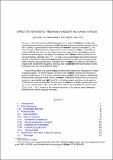| dc.contributor.author | Edelen, Nicholas | |
| dc.contributor.author | Naber, Aaron | |
| dc.contributor.author | Valtorta, Daniele | |
| dc.date.accessioned | 2021-02-10T19:38:46Z | |
| dc.date.available | 2021-02-10T19:38:46Z | |
| dc.date.issued | 2018-11 | |
| dc.date.submitted | 2018-06 | |
| dc.identifier.issn | 0025-5831 | |
| dc.identifier.issn | 1432-1807 | |
| dc.identifier.uri | https://hdl.handle.net/1721.1/129741 | |
| dc.description.abstract | A famous theorem by Reifenberg states that closed subsets of R[superscript n] that look sufficiently close to k-dimensional at all scales are actually C [superscript 0, γ] equivalent to k-dimensional subspaces. Since then a variety of generalizations have entered the literature. For a general measure μ in R[superscript n], one may introduce the k-dimensional Jones’ β-numbers of the measure, where β [superscript k][subscript μ] (x, r) quantifies on a given ball B[subscript r](x) how closely in an integral sense the support of the measure is to living inside a k-dimensional subspace. Recently, it has been proven that if these β-numbers satisfy the uniform summability estimate ∫ [superscript 2][subscript] β[superscript k][subscript μ](x,r)[superscript 2] dr/r < M, then μ must be rectifiable with uniform measure bounds. Note that one only needs the square of the β-numbers to satisfy the summability estimate, this power gain has played an important role in the applications, for instance in the study of singular sets of geometric equations. One may also weaken these pointwise summability bounds to bounds which are more integral in nature. The aim of this article is to study these effective Reifenberg theorems for measures in a Hilbert or Banach space. For Hilbert spaces, we see all the results from R[superscript n] continue to hold with no additional restrictions. For a general Banach spaces we will see that the classical Reifenberg theorem holds, and that a weak version of the effective Reifenberg theorem holds in that if one assumes a summability estimate ∫[superscript 2][subscript] β[superscript k][subscript μ] (x,r)[superscript 1] dr/r < M without power gain, then μ must again be rectifiable with measure estimates. Improving this estimate in order to obtain a power gain turns out to be a subtle issue. For k = 1 we will see for a uniformly smooth Banach space that if ∫ [superscript 2][subscript] β[superscript 1][subscript μ](x,r)[superscript α] dr/r < M[superscript α/2], where α is the smoothness power of the Banach space, then μ is again rectifiable with uniform measure estimates. | en_US |
| dc.description.sponsorship | NSF (Grant DMS-1606492) | en_US |
| dc.publisher | Springer Science and Business Media LLC | en_US |
| dc.relation.isversionof | https://doi.org/10.1007/s00208-018-1770-0 | en_US |
| dc.rights | Creative Commons Attribution-Noncommercial-Share Alike | en_US |
| dc.rights.uri | http://creativecommons.org/licenses/by-nc-sa/4.0/ | en_US |
| dc.source | Springer Berlin Heidelberg | en_US |
| dc.title | Effective Reifenberg theorems in Hilbert and Banach spaces | en_US |
| dc.type | Article | en_US |
| dc.identifier.citation | Edelen, Nick et al. "Effective Reifenberg theorems in Hilbert and Banach spaces." Mathematische Annalen 374, 3-4 (November 2018): 1139–1218 © 2018 Springer-Verlag GmbH Germany, part of Springer Nature | en_US |
| dc.contributor.department | Massachusetts Institute of Technology. Department of Mathematics | en_US |
| dc.relation.journal | Mathematische Annalen | en_US |
| dc.eprint.version | Author's final manuscript | en_US |
| dc.type.uri | http://purl.org/eprint/type/JournalArticle | en_US |
| eprint.status | http://purl.org/eprint/status/PeerReviewed | en_US |
| dc.date.updated | 2020-09-24T20:46:49Z | |
| dc.language.rfc3066 | en | |
| dc.rights.holder | Springer-Verlag GmbH Germany, part of Springer Nature | |
| dspace.embargo.terms | Y | |
| dspace.date.submission | 2020-09-24T20:46:49Z | |
| mit.journal.volume | 374 | en_US |
| mit.journal.issue | 3-4 | en_US |
| mit.license | OPEN_ACCESS_POLICY | |
| mit.metadata.status | Complete | |
